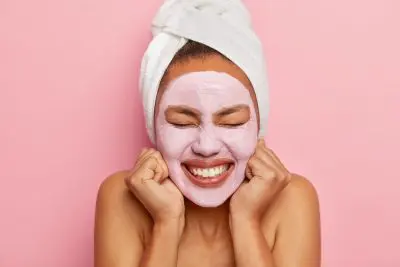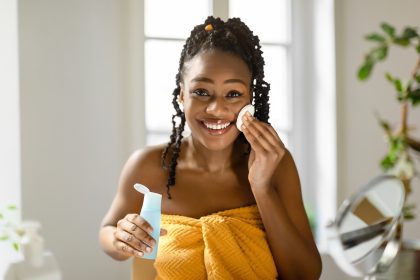You’ve probably spent hundreds of dollars on expensive dark spot treatments and brightening serums, but the most effective ingredient for fading hyperpigmentation might already be sitting in your kitchen right now. Lemon juice contains powerful natural acids that can lighten dark spots, age spots, and acne scars more effectively than many commercial products that cost ten times as much.
The citric acid in fresh lemon juice works as a natural chemical exfoliant, gently removing the top layers of darkened skin while inhibiting melanin production that causes spots to form in the first place. This dual-action approach makes lemon juice one of the most effective natural treatments for various types of hyperpigmentation.
What makes lemon juice particularly appealing for treating dark spots is its accessibility, affordability, and the fact that you can control exactly what goes on your skin without worrying about synthetic ingredients, harsh chemicals, or mystery additives that might cause irritation or allergic reactions.
Citric acid provides professional-strength exfoliation at home
Fresh lemon juice contains high concentrations of citric acid, an alpha hydroxy acid that’s commonly used in professional chemical peels and high-end skincare products. This natural acid works by breaking down the bonds between dead skin cells, allowing them to shed more easily and revealing brighter, more even-toned skin underneath.
The exfoliating action of citric acid helps remove the surface layers of skin where dark spots are most concentrated, gradually lightening hyperpigmentation over time. Unlike harsh scrubs that can damage skin and worsen dark spots, the chemical exfoliation from lemon juice is gentler and more targeted.
Citric acid also has the ability to penetrate deeper into skin layers than many topical treatments, allowing it to work on dark spots that have formed below the surface. This deeper penetration makes lemon juice particularly effective for stubborn spots that haven’t responded to other treatments.
The concentration of citric acid in fresh lemon juice is typically between 5-6%, which is similar to the levels found in many over-the-counter chemical exfoliants but without the added preservatives, fragrances, and other potentially irritating ingredients.
Vitamin C brightens skin and prevents new spot formation
Lemon juice is packed with vitamin C, a powerful antioxidant that plays a crucial role in skin brightening and dark spot prevention. Vitamin C inhibits tyrosinase, the enzyme responsible for melanin production, helping prevent new dark spots from forming while existing ones fade.
The antioxidant properties of vitamin C also protect skin from free radical damage caused by sun exposure, pollution, and other environmental stressors that can trigger hyperpigmentation. This protective effect helps prevent dark spots from becoming darker or more numerous.
Vitamin C supports collagen production, which improves overall skin texture and can help reduce the appearance of acne scars and other types of skin damage that often appear as dark spots. This collagen-boosting effect provides additional anti-aging benefits beyond just spot lightening.
The natural form of vitamin C in lemon juice is highly bioavailable and readily absorbed by skin, making it more effective than some synthetic vitamin C derivatives found in commercial skincare products that may not penetrate as effectively.
Natural bleaching compounds safely lighten hyperpigmentation
Lemon juice contains natural bleaching compounds including limonene and citronellal that work synergistically with citric acid to lighten dark spots without the harsh effects associated with chemical bleaching agents like hydroquinone.
These natural lightening compounds work gradually and gently, reducing the risk of irritation or rebound hyperpigmentation that can occur with stronger bleaching treatments. The gradual lightening process also creates more natural-looking results that blend seamlessly with surrounding skin.
Unlike synthetic bleaching agents that can thin the skin or cause sensitivity over time, the natural compounds in lemon juice actually support skin health while providing lightening effects. The combination of multiple active compounds creates a more balanced and sustainable approach to treating dark spots.
The bleaching action of lemon juice is particularly effective on surface-level hyperpigmentation such as sun spots, age spots, and post-inflammatory hyperpigmentation from acne, making it an excellent first-line treatment before considering stronger interventions.
Application methods determine effectiveness and safety
The key to using lemon juice effectively for dark spots is proper application that maximizes benefits while minimizing potential irritation. Fresh lemon juice should always be diluted before applying to skin, as undiluted juice can cause burns or increased sensitivity, especially when exposed to sunlight.
Mix fresh lemon juice with equal parts water or aloe vera gel to create a gentler treatment that’s still effective but less likely to cause irritation. This diluted mixture can be applied to dark spots using a cotton swab or pad, allowing for precise application without affecting surrounding healthy skin.
Leave the lemon juice treatment on skin for 10-15 minutes before rinsing thoroughly with cool water. This contact time allows the acids to work effectively without overexposing skin to potentially irritating compounds. Always follow with a moisturizer to prevent dryness.
Consistency is more important than strength when using lemon juice for dark spots. Daily application of properly diluted lemon juice will produce better results than occasional use of stronger concentrations that might cause irritation and disrupt the treatment process.
Timing and sun protection are absolutely crucial
Lemon juice makes skin significantly more photosensitive, meaning exposure to sunlight after treatment can actually worsen dark spots and cause severe burns. This photosensitizing effect is the most important safety consideration when using lemon juice for skin brightening.
Apply lemon juice treatments only in the evening, allowing several hours between application and any sun exposure. Even with thorough rinsing, the photosensitizing effects can persist for hours after treatment, making nighttime application the safest approach.
Broad-spectrum sunscreen with at least SPF 30 is absolutely essential when using lemon juice treatments, even on days when you don’t plan significant sun exposure. The increased photosensitivity can make skin vulnerable to damage from brief, incidental sun exposure like walking to your car.
Consider using lemon juice treatments only during months when sun exposure is naturally limited, or ensure you can completely avoid sun exposure for 24 hours after each treatment. The risk of worsening hyperpigmentation from sun exposure while using lemon juice is significant and can undo months of progress.
Results appear gradually with consistent use
Most people begin seeing subtle improvements in dark spots after 2-4 weeks of consistent daily use, with more dramatic results becoming apparent after 6-8 weeks of regular treatment. The gradual improvement reflects the natural skin cell turnover cycle and the time needed for deeper spots to surface and fade.
Newer, surface-level dark spots typically respond faster to lemon juice treatment than older, deeper spots that have been present for months or years. Age spots and sun damage may require longer treatment periods to achieve significant lightening.
Individual results vary significantly based on skin type, spot severity, and consistency of application. People with lighter skin tones often see faster results than those with darker complexions, though lemon juice can be effective across all skin types when used properly.
Patience is essential when using natural treatments like lemon juice, as the results develop slowly compared to professional treatments or prescription medications. However, the gradual improvement often looks more natural and is less likely to cause the patchy or uneven results that can occur with stronger treatments.
Safety considerations and when to avoid lemon juice
While lemon juice is natural, it’s not appropriate for everyone and can cause serious skin damage if used incorrectly. People with sensitive skin, eczema, or other inflammatory skin conditions should avoid lemon juice treatments as they can worsen existing irritation.
Never apply lemon juice to broken, irritated, or recently shaved skin, as the acids can cause severe burning and potentially permanent scarring. The treatment should only be used on intact, healthy skin that can tolerate mild chemical exfoliation.
Discontinue use immediately if you experience severe redness, burning, blistering, or increased dark spots, as these signs indicate that your skin cannot tolerate the treatment. Some people may develop contact dermatitis or allergic reactions to compounds in lemon juice.
Consider consulting a dermatologist before using lemon juice for dark spots, especially if you have a history of skin sensitivity, are taking medications that increase photosensitivity, or have extensive hyperpigmentation that might require professional treatment for best results.
The most important safety rule is never to underestimate the power of this natural treatment, as the acids in lemon juice can cause significant skin damage when used improperly, despite being a common kitchen ingredient.


















